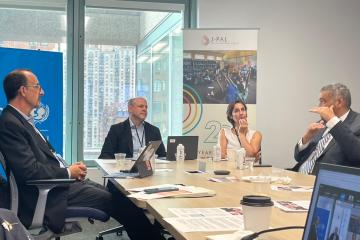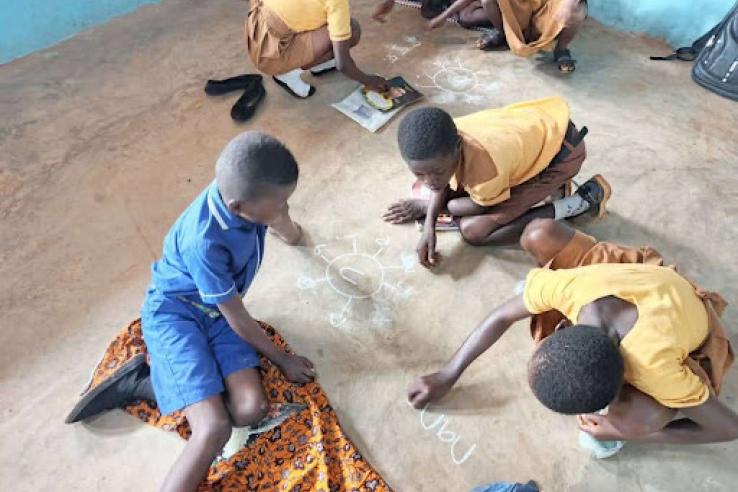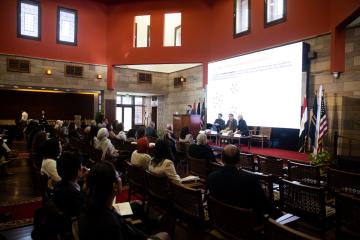
From training to impact: Strengthening foundational learning in Ghana

This is the second blog post in a series highlighting how UNICEF and J-PAL are working together to strengthen evidence use in education. The first blog post reflected on insights from global experts working to adapt and scale evidence-based education programs. This post builds on the first by exploring the on-the-ground experiences of two education practitioners in Ghana who are putting those ideas into action.
We first met Agnes and Fati through the 2024 J-PAL/UNICEF Learning Academy, a training that paired J-PAL’s Evaluating Social Programs online course with virtual group discussion sessions. Designed for education practitioners and government partners, the Learning Academy aimed to build skills for using evidence to strengthen foundational literacy and numeracy programs. Over the course of four weeks, participants had the opportunity to learn from one another’s experiences and apply course concepts to their own work.
Agnes Arthur is an education specialist with UNICEF Ghana, and Fati Issifu, a former teacher and first runner-up of the 2022 Ghana teacher prize, works at the nonprofit Promoting Equality in African Schools. Both women were interested in participating in the Learning Academy cohort to better understand how to evaluate the impact of the programs they work on.
Coincidentally, they both worked on the implementation and scaling of the Differentiated Learning Plus (DL+) program throughout schools in Ghana. Inspired by the Teaching at the Right Level approach, the DL+ program is based on the concept of differentiated learning, a teaching model that tailors instruction to the individual needs of students.
We sat down with Agnes and Fati to learn about their work using evidence to transform classrooms and scale effective approaches across Ghana.
Challenges and opportunities for evaluation and evidence
In Ghana, more children are enrolled in school than ever before—yet nearly 80 percent leave primary school without the basic reading and math skills they need to succeed.
The learning crisis has prompted growing interest in how education programs are designed and whether they are making a difference. One of the major challenges to answering those questions, Agnes explained, is that new learning models are often introduced without a clear plan for evaluating their impact: “But this is changing [...], we are transforming the situation,” she noted.
At UNICEF, her team—partnering closely with the government—has worked to refine the concepts behind differentiated learning. To help educators apply this approach effectively, they are promoting a locally developed dashboard that delivers real-time data and insights on students’ progress.
“Most of our work is co-creating. We are bringing government officials together to design education programs collaboratively. This way, they get to understand and appreciate that you need to accompany such interventions with evidence, so that when you take them to scale, you can make an informed decision.”
— Agnes Arthur, Education Specialist, UNICEF Ghana
Fati, who worked as a trainer during the implementation of the DL+ program, shared that many school leaders and educators may not have the proper training to interpret and apply evidence. This can make it difficult to shift long-standing practices. “Teachers on the ground are used to a certain way of doing things,” she explained, such as only conducting learning assessments at the end of the school year.
But for differentiated learning to be successful, students’ knowledge should be assessed prior to instruction so that they can be grouped by learning levels. Making the shift from assessing learning at the end of the school year to leveraging assessment to inform instruction requires not only stronger systems, but also support and training for educators to engage with and apply insights from the data they now have access to.
From insights to impact
The Learning Academy built on the work Agnes and Fati were already doing—offering space to reflect, new tools to strengthen their approach, and a chance to connect evaluation concepts with day-to-day program decisions.
Both Fati and Agnes emphasized the value they found from deepening their knowledge around building a program theory of change. For Fati, it shifted how she thinks about evaluation from a one-time event at the end of the program to an ongoing process that is embedded in program design. “Building a theory of change is actually very difficult, but once you get it right, whatever you are doing becomes very easy,” shared Agnes.
Inspired by what she learned during the training, Fati worked with her team to introduce unannounced visits to teachers implementing the DL+ program in their classrooms. “To our surprise, we realized that some of them were not following the program we asked them to. They were not meeting the fidelity of the program.”
When improved monitoring revealed gaps in implementation, Fati’s team drew on emerging evidence to guide their next steps. A recent evaluation in Ghana found that in-person refresher trainings significantly improved teachers’ implementation of the differentiated learning approach, while digital modules had little impact due to low engagement.
Based on this research, her team organized a two-day refresher training for teachers to reinforce the core components of the program and clarify expectations. “It’s picked up—we are now improving and the program is going very, very effectively,” Fati said.
Fati’s experience shows how even small changes that are grounded in evidence can improve program implementation and strengthen the link between instructional design and classroom practice.
Building a culture of evidence use
For both Fati and Agnes, rigorous evidence is crucial to their work—and they note that its use to inform program design is increasing across Ghana. They agree that evidence allows policymakers to tailor scarce resources to regions and sectors that really need them. “It also builds credibility with stakeholders and funders,” shared Fati, who secured funding to set up a nonprofit to implement the differentiated learning approach in hard-to-reach schools in the country.
Agnes is now gearing up for an endline evaluation of the DL+ program to see whether improving access to real-time, classroom-level data has led to measurable gains in student learning outcomes. When asked about advice she might share with colleagues who are looking to incorporate evidence into their work, she suggests that finding ways to embed evaluation throughout implementation is critical to understanding which aspects of a program should be scaled and which can be dropped. Fati echoes the importance of focusing on evaluation: “Start small, pilot, and use data to adapt before scaling.”
“In Ghana, where we have some regions and districts with serious learning gaps, it is very important to us to know what works. I believe that to guess and to continue guessing, especially within the African education system, is very dangerous.”
– Fati Issifu, School Improvement Officer, Promoting Equality in African Schools
Fati and Agnes’ experience reflect a broader shift taking root in Ghana’s education system—one that puts data, evaluation, and inclusive pedagogy at the center of education reform. Their stories underscore how building the capacity of educators and fostering close collaboration between practitioners, policymakers, and researchers across the education system can ensure that data and evidence lead to meaningful improvements in how children learn.
Related Content

Where evidence meets practice: Inside UNICEF and J-PAL’s FLN Academy 3.0
Teaching at the Right Level: The Government’s New Education Policy Must Include Solutions to Teach Students Basics


